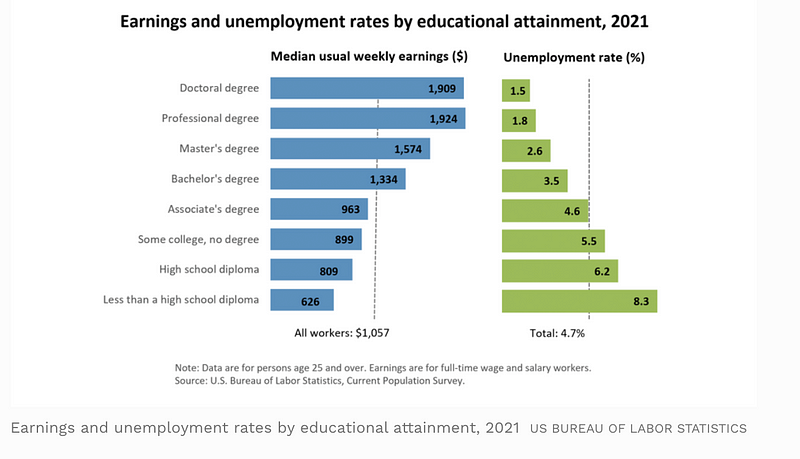The Value of Higher Education: Debunking the Myths
Written on
Chapter 1: Understanding the Backlash Against Higher Education
The disdain for higher education is increasingly prevalent, particularly among those who actually gain from an uninformed society. This is often seen within certain political groups. Yet, the platform Medium is largely frequented by more liberal voices. So, why is there such a strong undercurrent of anti-intellectualism in this space?
One of the most frequent criticisms I encounter is the exorbitant cost and perceived difficulty of higher education. However, doesn't this apply to many valuable pursuits? Consider what truly matters to you: traveling, nurturing family relationships, or achieving career success. None of these aspirations come easily or without significant investment.
For instance, climbing Mt. Everest can set you back anywhere from $30,000 to $160,000, plus 8 to 12 months of rigorous training for those already in good shape. This endeavor brings no guaranteed benefits, yet few would mock those who undertake such a challenging feat. Ultimately, individuals pursue these goals simply because they can. Conversely, those seeking self-improvement through education often find themselves having to defend their choices.
I observed a trend a few years ago where, upon gaining a following and some financial success, many writers felt compelled to publicly denounce formal education, branding it as a waste of time and resources.
Two years ago, I unfollowed someone who began to consistently post against higher education. Despite being a successful author, his contempt for education was disheartening. Ironically, he also offered classes, which seemed contradictory to his stance. A particularly frustrating moment was when he shared a post titled something like, "Why C Students are the Bosses of A Students."
While I might seem harsh, that title echoed the frustrations of a high school athlete dismissing the value of education while harboring prejudices against those who excel academically.
Recently, I received an email from another successful writer mocking the concept of higher education. Why does this keep happening?
To address this issue, we need to differentiate between a Bachelor’s degree and advanced degrees like a Master’s or Ph.D., as they serve different purposes. It is generally accepted that a Bachelor’s degree is intended to help graduates secure good jobs and earn a stable income.
Critics argue that Bachelor’s degrees have become commonplace, akin to high school diplomas. However, statistics paint a different picture. According to Gitnutx market data, 48% of Generation X holds a Bachelor’s degree, while the numbers drop to 38% for Millennials and a concerning 33% for Generation Z. This decline is troubling, especially in a society that aspires for future generations to exceed the achievements of their predecessors.
So, is pursuing a Bachelor’s degree still worthwhile? Absolutely. Forbes states in “Why a Bachelor’s Degree Is Worth It” that despite the financial burden, obtaining a degree is highly beneficial. The accompanying chart illustrates the stark employment gap between those with and without a Bachelor’s degree.

Forbes
CNBC adds that holding a Bachelor’s degree opens doors to job opportunities that would otherwise be inaccessible. This is especially critical for minorities, as African American males without degrees face double the unemployment rate of their educated counterparts.
While a Bachelor’s degree may prove its worth, what about advanced degrees? It's essential to recognize that individuals pursue higher degrees for various reasons. Young adults typically seek a Bachelor’s to qualify for well-paying positions, while others may pursue advanced studies for specialized skills or simply out of a passion for learning.
I earned my Master’s degree in history driven by my love for knowledge. Although I contemplate teaching at the college level, which would necessitate a Ph.D., my primary focus remains writing.
While a higher degree does not inherently grant artistic talent, it has equipped me with critical thinking skills at an advanced level—a vital asset for a writer. I pursued my Master’s for the same reason climbers tackle Everest: I could do it, and I take pride in my accomplishments, just as an athlete would.
Thus, we affirm that a Bachelor’s degree is a sound investment, and while advanced degrees might not always lead to higher earnings, they remain commendable achievements.
So, what fuels the animosity toward education? Many of these writers were likely told by friends and family that they would never achieve anything without a degree. Now that they have found success, they seem eager to flaunt it in front of their naysayers. I understand that motivation.
However, it's crucial for them to temper this negative impulse and consider its impact on their audience. Discouraging others from pursuing a college degree can be damaging to the majority. While it’s admirable that some individuals have succeeded without formal education, such cases are exceedingly rare. For most, a college education is essential for long-term financial stability.
Lacking a degree does not equate to a lack of intelligence, but asserting that degrees lack value is indeed detrimental.
Chapter 2: The Consequences of Denying Educational Value
In this video, "Why Visual Novels are the Supreme Entertainment Medium," we explore the unique storytelling capabilities of visual novels and their impact on modern entertainment.
In the second video, "Why Most People Will Remain in Mediocrity," we delve into the factors that contribute to societal complacency and the importance of striving for personal growth.